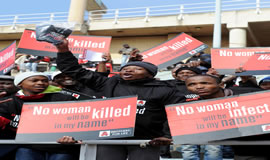
A recent Statistics South Africa report revealed that at least one in five South African women have experienced some form of gender-based violence. Sadly, most perpetrators of this crime get away unpunished as their victims suffer in silence.
These chilling statistics will once again be in the spotlight as government rolls out several campaigns over the next coming months aimed at highlighting the problem of violence against women and children in the country.
One campaign that is expected to grab the public’s attention is the #100MenMarch against women and child abuse that government, in partnership with civil society and business, is organising on 10 July. The march in Pretoria, which will proceed from Church Square to the Union Buildings, is expected to draw 100 men from each participating organisation or sector.
The #100MenMarch coincides with the centenary celebrations for former President Nelson Mandela and struggle activist Mama Albertina Sisulu.
“We call on all men to join the #100MenMarch and boldly declare that South Africa must be safer for women and children. The #100MenMarch will give rise to an unstoppable force that will ensure women and children live free from violence and abuse,” government had said.
Although many South African men individually continue to condemn the abuse of women and children, the #100MenMarch is expected to display a united voice against the scourge of gender-based violence.
Women-led organisations have been known to be at the forefront in the struggle against gender-based violence. Many women know too well the pain of abuse. Take 37-year-old Lerato Mbatha, who suffered physical abuse at the hands of her partner for many years.
Like many victims of abuse, Mbatha, who hails from Hammanskraal, north of Tshwane, could not confide in anyone about her ordeal. She was too ashamed to speak to her family since they were against the relationship in the first place. She also did not report the crime to the police because she says, at the time, she had no faith in the justice system.
That was more than six years ago. Today, Mbatha is among a group of activists involved in campaigns against gender-based violence that encourage victims to stand up against their abusive partners.
As a survivor of abuse, Mbatha admits that it’s not always easy to walk away from an abusive relationship. The victims, she says, tend to overlook their abusers flaws and blame themselves for making their partners angry.
In her case, when the beatings started, she couldn’t tell her parents because she was not ready to hear the truth. Her parents were against the relationship and this made her leave home and move in with her boyfriend.
Like in most relationships, the first few months were “perfect”. Even though she was the only one working, she had no problem supporting her boyfriend.
Things changed soon after she gave birth to the couple’s daughter. From then, the relationship would never be the same again.
“He became obsessed and started accusing me of things. He would come back from drinking in the middle of the night and start shouting at me.
“He would place a gun and knife on the table and ask me to choose which weapon I prefer him to use to kill me. I would apologise for something I don’t even know and begged him not to kill me. The following day, he would apologise and promise to change,” says Mbatha.
However, the beatings never stopped and no one picked up the signs of abuse because she covered up the bruises on her face with makeup.
But tired of the beatings and protecting her abuser, one day Mbatha decided enough was enough.
She took a giant leap of faith and decided it was time to stand up against her abuser and knew that the first step was to stop protecting the perpetrator. She decided to come clean about the abuse and sought help.
She decided to join the #NotInMyName initiative, an organisation that organises campaigns calling for an end to violence against women and children.
The organisation has assisted victims of abuse to get justice and also helps them to reopen cases, which were not investigated. The social movement has a unique approach in dealing with victims of abuse in that it assists the victims of rape, drug abuse and gender-based violence by referring them to therapy to help them deal with their ordeal. The organisation also works with boys in a bid to prevent and end the scourge of abuse.
In May this year, hundreds of people took part in the #NotInMyName march against women abuse. The march to the Union Buildings came in the wake of rolling reports of rape, murder and other gender-based violence in the country. The movement is probably one of the only in the country that assists rape and gender-based violence victims open cases and supports victims by accompanying them during court appearances.
Thanks to the holistic help she received from the #NotInMyName initiative, Mbatha is now able to focus her energy on raising her three daughters and fighting for justice for other victims of gender-based violence.
Mbata feels that anti-abuse campaigns should also target young boys who are sometimes affected by the abuse, and they in turn become abusers. This is what the #100MenMarch also seeks to achieve. – SAnews.gov.za


